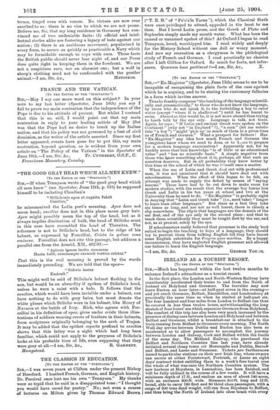in a form which invites answer.
Thus he frankly compares "the teaching of the language scientifi- cally and grammatically," to those who do not know the language, by those who do not speak it, to the forbidding a boy to enter water (except "where it is shallowest") until he has learnt to swim. Absurd as this would be, it is not more absurd than trying to teach talk by the eye only. Language is talk, not texts. Again, he says : "If Latin and ancient Greek were spoken on the Continent" ('why not "in England" ?), "a man" (let me substi- tute "a boy") "might 'pick up' as much of them in a, given time as of French and German." What a prospect for fathers ! Has " Ex-Magister " any idea how much French and German the youngsters know whom we send to Jena or to '1.11ra to prepare for a modern language examination? Apparently not, for he hardily avers that this knowledge "is of little or no educational value" and "has no scientific basis." A simple negative from those who khow something about it is, perhaps, all that such an assertion deserves. But in all probability they know better by this time at the school of which he was himself once a master.
When the use of Latin and Greek died out with professional men, it was not unnatural that it should have died out with schoolmasters. When the effect of this began to be felt, an attempt was made to supply the defect by means of "saying lessons." These have had to be cut down to make room for modern studies, with the result that the average boy learns less Greek and Latin in his ten years at school and two at the University than he used to do. " Ex-Magister " is probably right in denying that "Latin and Greek take" (i.e., need take) "longer to learn than other languages." But since as a fact they take six times as long, and are not as well learnt, there is clearly a slip somewhere. The slip is that languages are the domain of the ear first, and of the eye only in the second place ; and that to teach them scientifically they must be taught first by the ear, and not, as at present, solely by the eye.
If schoolmasters really believed that grammar is the study best suited to begin the teaching to boys of a language, they should try to prevent them from talking English till they have learnt some English substitute for Propria quae man bus. By a happy inconsistency, they have neglected Englieh grammar and allowed our babies to learn the English language.
—I am, Sir, &c. GEORGE YOUITG.


























































 Previous page
Previous page